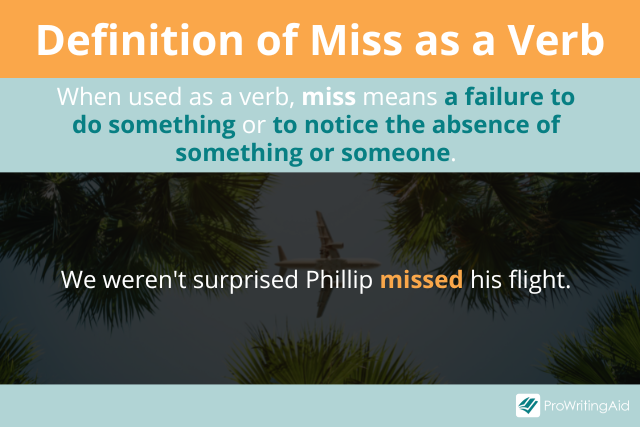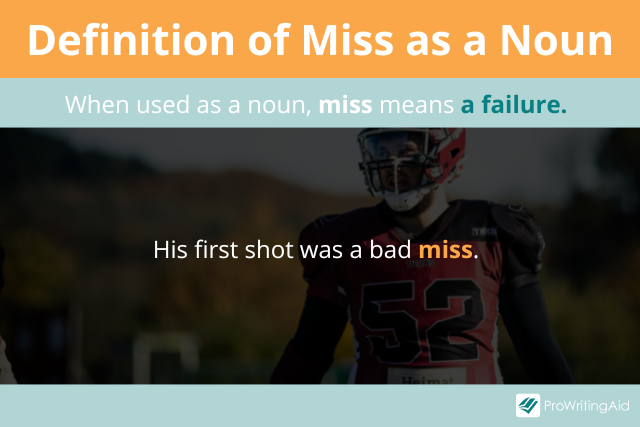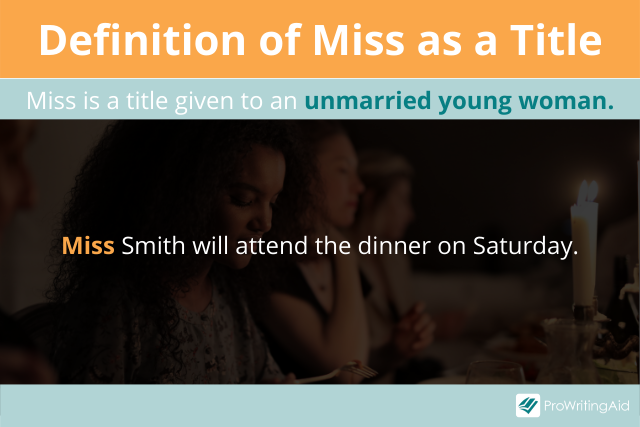
The English language is full of homonyms, which are words with different meanings that are pronounced and spelt the same. One of the most common homonyms is miss.
Miss belongs to different parts of speech, so it has many definitions.
In this article, we’ll explain the various functions and meanings of miss, and show you plenty of examples to illustrate the difference.
What Does Miss Mean?
Miss can be used as a verb and a noun. It has multiple meanings depending on its grammatical function. Let’s explore the different definitions.
Miss Meaning: Verb
As a verb, miss can be used in its infinitive form (miss), present participle form (missing), and past participle form (missed). Below, we’ll look at its various meanings as a verb, and some examples of it in use.

To fail to hit something. This is typically refers to an object that was thrown or shot:
- She threw her phone at the door but managed to narrowly miss it.
To fail to score a goal when playing sports:
- The coach was annoyed that his star player missed the winning goal.
To notice the absence of something:
- Mary was too observant not to notice the money was missing.
To fail to understand the significance of something:
- I’m not surprised that you missed the point entirely.
To arrive too late to an event or activity:
- We weren’t surprised that Fay missed his flight.
To feel sad about the absence of someone:
- Even though Gregg had spent the entire day with Sharon, she still missed him once he left.
To avoid or escape:
- If you want to miss the morning traffic, take the detour route.
To fail to be present:
- They all agreed that the kids could miss a day of school.
To fail to take advantage:
- This opportunity is too good to miss.
If you’re struggling to find the right verb form of miss to use in your writing, ProWritingAid can flag errors in your work and suggest the correct usage. Try it for free today!
Miss Meaning: Noun
When used as a common noun, miss refers to a failure. Let’s take a look at the specific meanings and how you can use them in a sentence.
A failure to hit something:
- His first shot was a bad miss.
A failure of any kind, such as not meeting a goal or getting a desired result:
- We’ve been to that restaurant three times and it’s a bit hit and miss.

Miss is also a title used to refer to a young woman or an unmarried woman. Always capitalize Miss when it’s used as a prefix for a name or surname. As it’s not a shortened form, there’s no need to follow it with a period.
- Miss Smith will attend the dinner on Saturday as well.
- Miss Mary Jones no longer goes by her married name.
If you’re unsure of a young girl’s name, miss is a polite way to address her. You might have heard older people use miss, because it’s an old-fashioned term. We don’t usually capitalize miss when it’s used as a term of address.
- You dropped your hat, miss.
- What can I do for you today miss?
Young children often use miss when addressing a female teacher too, whether she is married or not. This usage is common in the UK.
- Excuse me miss, please can you mark my test?
Have you ever watched Miss Congeniality? Miss is a title given to a woman who wins a beauty contest.
It’s usually combined with the name of the place she’s representing, but it can also preface a competition name, like Miss Universe or Miss America.
- Linn Bjurström Salonen was crowned Miss Sweden in 2022.

What Is a Miss?
A miss is a part of a British phrase that’s typically used in informal conversations. To give something a miss means to choose not to do something or to go somewhere.
- I had homework to do, so I decided to give the party a miss.
What Is the Meaning of Misses?
Now that we’ve covered all the meanings of miss, what about misses?
Misses is the third-person singular form of miss. Normally, third person singular verbs end with an -S, however, miss follows a different rule. Instead, add -ES to the end to make the correct form.
- He misses his husband so much.
Misses is also the plural of the noun miss. We use this if we’re referencing multiple failures.
- Well done! You scored eight hits and only two misses.
- Her movies have been a mixture of hits and misses.
As a plural noun, misses has an additional meaning. It refers to a range of standardized women’s clothing sizes, for example 6–20. You can also use misses to indicate the department where these garments are sold. This is a somewhat old-fashioned usage.
- You’ll find the camel coat in the misses section.
How to Use the Word Miss
How you use miss and its forms depends on the function you want it to carry out. You can use miss as a noun or a verb, as long as it makes sense within the sentence structure.
You should look at the context of a sentence to decide whether miss is the appropriate word choice.
You’ll have frequently used miss in your own conversations—it appears in many well-known idioms. Here are some of the most common:
Miss a beat
When you miss a beat, you have hesitated. Alternatively, to not miss a beat means doing something without fault.
- The presenter didn’t miss a beat with his speech, even as the angry protesters hurled insults.
Miss out on
If you miss out on something, it means you’ve lost an opportunity.
- I really don’t want to miss out on this promotion.
Miss the boat
To miss the boat means you’ve failed to take advantage of a good opportunity.
- The company missed the boat by not investing in the latest technology earlier.
Examples of Miss in Sentences
Now that you know all the different miss meanings, here are some examples of it being used in a sentence.
- Oh, thank you, miss.
- Try not to miss the plane tomorrow morning.
- Sarah missed her colleagues when she was laid off.
- Nathan is going to miss living in Paris.
- Fiona missed the entrance because the sign has fallen over.
- Craig spotted a crucial mistake everyone else had missed.
- Maeve’s sharp eyes missed nothing.
- The bullet just missed her heart.
- I miss having so much free time.
- I’m going to miss David when he moves away—the thought makes me sad.
- Who could miss such a beautiful sunset?
- In 2011, they crowned Teresa Scanlan Miss America.
- Somehow, the batter managed to miss the ball entirely.
- I want to get front-row seats at the theatre so we don’t miss the opening number.
- At school today, miss told me my spelling is improving.
How Do You Define Miss?
As we’ve discovered, miss is a word with lots of different meanings.
As a verb, it means to fail to hit something, to avoid something, to feel the absence of someone or something, and even to arrive late. As a noun, miss means a failure, and it’s also used as a title and term of address for young women, female teachers, and beauty queens.
Bet you’re glad you didn’t miss this article!


